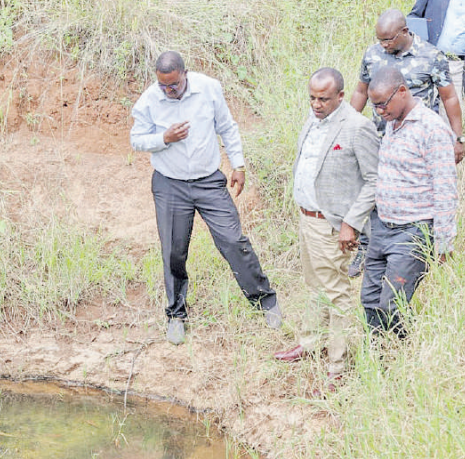
A Senate committee has ordered a fresh clean-up of the oil-contaminated Thange River in Makueni county.
During a fact-finding visit to the area, it also called for urgent action to protect affected residents, including compensation, medical support and the provision of alternative sources of clean water.
A decade after the oil spill, residents of Thange village continue to suffer from severe health complications, some reportedly fatal.
There is also ongoing environmental degradation directly linked to the 2015 pipeline leak.
“First, there must be clean and sufficient drinking water for the residents of Thange,” committee chairman Senator Oburu Odinga said.
Residents narrated how the spill has devastated lives and livelihoods.
Some have died from kidney, heart and other ailments believed to be connected to the contamination, they said.
Makueni Governor Mutula Kilonzo Jr said the oil spillage runs 15 feet beneath the ground.
“The aftermath continues to claim lives,” he said. “Cancer and kidney failure have become rampant.”
The senators criticised the Kenya Pipeline Company and the National Environment Management Authority for failing to adequately respond to the crisis over the years.
“We have witnessed that the spill area is still contaminated. KPC should take responsibility. It should not leave the burden to the Makueni governor,” Odinga said.
“KPC must begin by providing clean water to the affected communities.”
In response, KPC said it has already compensated 342 households with Sh38 million and had offered to drill a borehole during the incident's intervention phase.
However, disputes among villages over the suitable drilling site stalled the project.
Meanwhile, it has maintained clean-up efforts for more than three years using both internal and external expertise.
Nema subsequently issued KPC a scale-down and decommissioning notice after test results reportedly showed no presence of hydrocarbons in water and soil as of April 2025.
However, during the Senate’s visit, Nema director general Mamo Mamo said the authority would reassess its position following new evidence suggesting continued contamination.
“We will relook at the whole thing now that new evidence is coming up. We will not allow citizens to utilise this water in its current state,” he said.
The oil spill, which occurred on May 12, 2015, was traced to a suspected leak in the Mombasa-Nairobi pipeline.
Though emergency teams were deployed, by June 15 that year, petroleum traces had already reached the Thange River in Kibwezi East constituency.
In a petition to the Senate Standing Committee on Energy, Thange MCA Erick Musyoki Katumo outlined how the spill caused widespread land and water pollution.
Residents say their once fertile farmland is no longer arable, and their water sources are unsafe due to suspected lead contamination.
“The oil spillage led to the loss of agricultural productivity. Our land is no longer usable, and we’re forced to buy vegetables and fruits from towns like Wote to avoid health risks,” one resident said.












